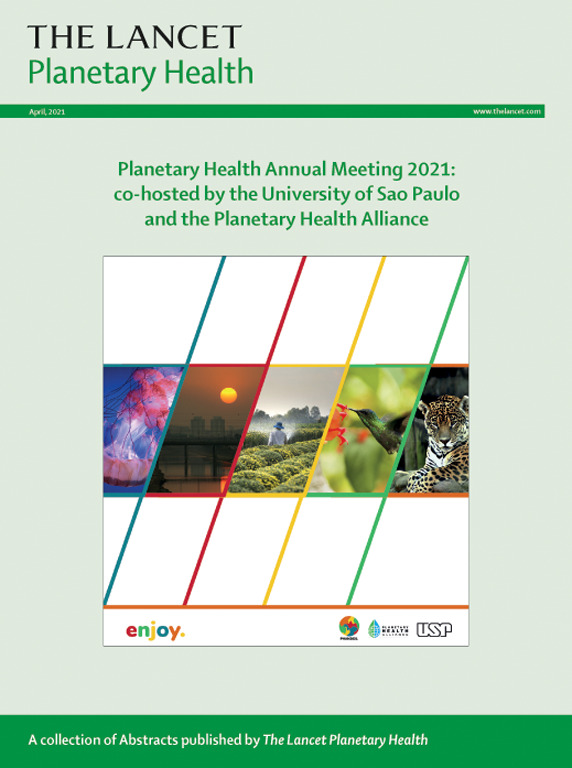Dietary quality and environmental footprint of health-care foodservice: a quantitative analysis using dietary indices and lifecycle assessment data
IF 21.6
1区 医学
Q1 ENVIRONMENTAL SCIENCES
引用次数: 0
Abstract
Background
Despite the key role of diets for individual and planetary health, the food offered in health-care institutions has received very limited attention to date. An assessment of the overall healthiness of foodservice in health-care institutions is missing from the literature, as is detailed information on its environmental footprint. This study aims to provide a comprehensive assessment of the healthiness, nutritional adequacy, and the environmental footprint of foodservice in a sample of German hospitals and nursing homes.
Methods
We investigated the dietary quality and environmental footprint of foodservice in two hospitals and three nursing homes in Germany (two in northern Germany, two in eastern Germany, and one in southern Germany). Average daily meals were derived from meal plans and recipes and analysed for dietary quality, using the Healthy Eating Index-2020; adherence to the Planetary Health Diet; and nutritional adequacy. The environmental footprint was analysed by allocating procured foods to 50 food groups and using an environmental database to estimate impacts on land use, greenhouse gas emissions, eutrophication, acidification, and water use.
Findings
Dietary quality was low, with institutions scoring 39–57 of 100 points on the Healthy Eating Index-2020. Adherence to the Planetary Health Diet was also low, reflected in Planetary Health Diet Index scores of 30–44 of 150. Most calories were from animal-source foods and unhealthy plant-based foods, with less than 20% of calories from wholesome plant-based foods. Meals were consistently high in saturated fat and salt, and low in fibre, while protein was insufficient in nursing homes. Micronutrient provision varied, with several B vitamins, vitamin C, potassium, and magnesium critically low in almost all institutions. Animal-source foods were responsible for three-quarters of the environmental impact, with meat alone contributing 38% of greenhouse gas emissions and 33–45% of other environmental impacts. About 60% of procured protein was from animal-source foods, while legumes made up less than 1% of procurement by weight.
Interpretation
Meals served in health-care institutions such as hospitals and nursing homes might compromise both short-term and long-term health of patients and residents and contribute unfavourably to the institutional environmental footprint. This study highlights the urgent need to regularly assess foodservice in health-care settings, align it with recommendations for healthy and sustainable diets, and improve nutritional care.
Funding
German Federal Environmental Foundation (Deutsche Bundesstiftung Umwelt).
保健食品服务的膳食质量和环境足迹:使用膳食指数和生命周期评估数据的定量分析。
背景:尽管饮食对个人和全球健康具有关键作用,但迄今为止,卫生保健机构提供的食物受到的关注非常有限。文献中缺少对医疗机构餐饮服务整体健康状况的评估,也缺少关于其环境足迹的详细信息。本研究的目的是提供一个全面的评估健康,营养充足,并在德国医院和养老院的样本餐饮服务的环境足迹。方法:我们调查了德国两家医院和三家养老院(两家在德国北部,两家在德国东部,一家在德国南部)餐饮服务的饮食质量和环境足迹。每日平均膳食量来自膳食计划和食谱,并使用“健康饮食指数-2020”对饮食质量进行分析;遵守行星健康饮食;营养充足。通过将采购的食品分配到50个食品类别,并使用环境数据库估计对土地利用、温室气体排放、富营养化、酸化和用水的影响,对环境足迹进行了分析。调查结果:饮食质量较低,在健康饮食指数-2020的100分中,各机构得分为39-57分。对行星健康饮食的坚持程度也很低,这反映在行星健康饮食指数的30-44分(满分150分)上。大多数卡路里来自动物来源的食物和不健康的植物性食物,不到20%的卡路里来自健康的植物性食物。养老院的膳食中饱和脂肪和盐的含量一直很高,纤维含量很低,而蛋白质含量也不足。微量营养素的供应各不相同,在几乎所有机构中,几种B族维生素、维生素C、钾和镁都极低。动物源食品对环境的影响占四分之三,仅肉类就占温室气体排放的38%,其他环境影响的33-45%。大约60%的采购蛋白质来自动物源食品,而豆类占采购重量的不到1%。解释:在医院和养老院等保健机构提供的膳食可能会损害患者和居民的短期和长期健康,并对机构的环境足迹产生不利影响。这项研究强调,迫切需要定期评估卫生保健机构的餐饮服务,使其符合健康和可持续饮食的建议,并改善营养保健。资助:德国联邦环境基金会。
本文章由计算机程序翻译,如有差异,请以英文原文为准。
求助全文
约1分钟内获得全文
求助全文
来源期刊

Lancet Planetary Health
Multiple-
CiteScore
28.40
自引率
2.30%
发文量
272
审稿时长
8 weeks
期刊介绍:
The Lancet Planetary Health is a gold Open Access journal dedicated to investigating and addressing the multifaceted determinants of healthy human civilizations and their impact on natural systems. Positioned as a key player in sustainable development, the journal covers a broad, interdisciplinary scope, encompassing areas such as poverty, nutrition, gender equity, water and sanitation, energy, economic growth, industrialization, inequality, urbanization, human consumption and production, climate change, ocean health, land use, peace, and justice.
With a commitment to publishing high-quality research, comment, and correspondence, it aims to be the leading journal for sustainable development in the face of unprecedented dangers and threats.
 求助内容:
求助内容: 应助结果提醒方式:
应助结果提醒方式:


